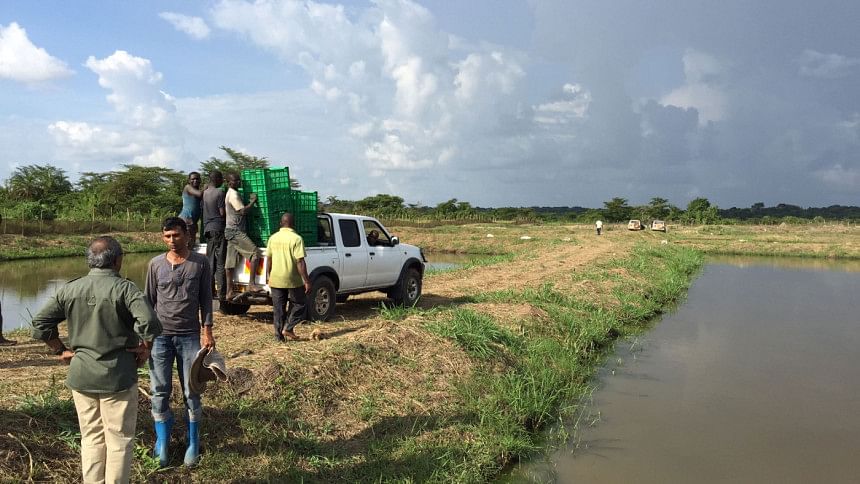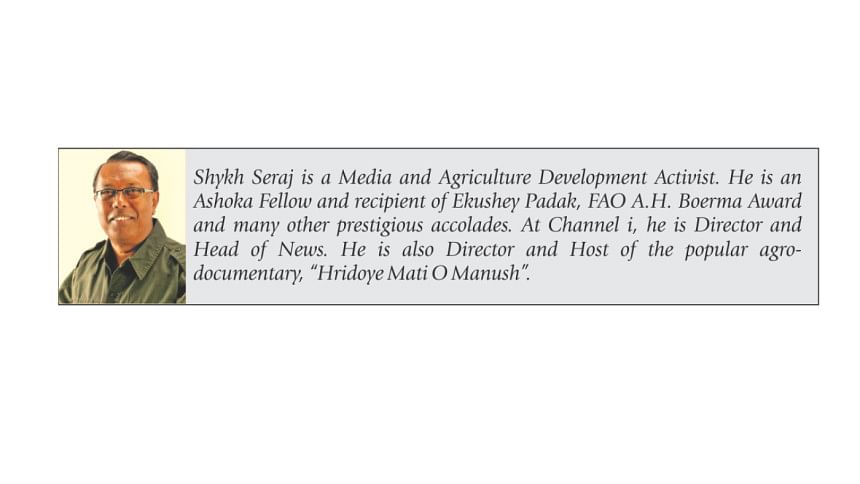Contract farming: A prospect yet to be unveiled

I met Farid in Qatar's Alkhor area in 2011. Farid, who hails from Chattogram, went to Qatar as a labourer in 2001 and like other expatriate workers, he was working there day and night. He worked for decades at his Qatari Sheikh's organization. One day he saw a piece of a fallow land near his office and started thinking what crops can be cultivated there. His colleagues laughed at him and said, "Hey, will there be any crop on this land where the soil is filled with sand, stones, rocks and gravels." But Farid was adamant in his decision and started farming by taking lease of the land from the owner of the company at a nominal price. He had believe that he would find soil under the rocks and sand. He kept digging the soil with a spade but found a lot of slate stones beneath the soil. It was difficult to remove those from the ground and the job would have been easier if he had a tiller.
He made a tiller or plough like object with a piece of metal. The problem was, who would pull that as there were no bulls, but horses and donkeys. Horses cost a lot. In the end, Farid bought a donkey and removed the stones and finally started farming. It was like turning impossible to possible. By the time I went to Farid's farm, it was already three-year-old. It was sheer hard work, I tell you my dear readers.
With hard work, concentration and dedication Bangladeshi workers like Farid are making amazing success stories in different countries of the world. Farid continued to increase the amount of leased land in the following years. He created employment opportunities for Bangladeshis workers, started commercial farming in full swing and became an entrepreneur in Qatar. In 2014, I went to Farid's farm again which literally turned huge. Red spinach, spinach, tomato, cabbage, cauliflower, and radish: there were so many vegetables there. Twenty five young men were working at his farm and following his footsteps Alkhor region has many other farms now. Farid was stressing on an issue that Qatar imposed strict regulations over Bangladeshi expatriates. As a result, Bangladeshi workers were decreasing at the farm and vacant posts are being occupied by workers from India, Pakistan, Nepal and other countries. After learning about the issue, I took the then Bangladeshi Ambassador in Qatar, Ashud Ahmed to Farid's farm. He said he would discuss the matter at the higher level.
Not just Farid, I have seen Abdur Razzak from Pirojpur's Mathbaria, who started one of the largest agricultural farms at Al Faisal, in Kuwait's Wafra region. In Oman, Mustafiz has set up a commercial farm on around 70 acres of land. Sohel has set up a fish farm at Chicabo village in Luwero district of Uganda, Africa. For 15 to 20 years, Bangladeshi entrepreneurs in different parts of the world, including Malaysia, the Middle East and Africa, have occupied a unique position. However, the government has barely thought that it is possible to employ the skilled agro-workers in the farming sector in abroad.
The whole world is going through a difficult time because of the spread of coronavirus pandemic. United Nation's World Health Organization, Food and Agriculture Organization, have repeatedly warned of food shortages. By the infinite mercy of the almighty, we have handled the matter using our skills in Bangladesh. As the pandemic approached quite viciously in every part of the world, Bangladeshi expatriate workers were told to return home and forced to quit their jobs. They became unemployed. Regarding this when Covid-19 was at the peak during March-April, 2020, I talked to our Foreign Minister AK Abdul Momen and asked him to look into the matter. The honourable minister took the proposal very seriously. I also spoke with Ambassador Golam Masih in Riyadh, Saudi Arabia. He said farming in Saudi Arabia is very expensive and their government is trying to build farms in the African country of Sudan, as farming is much cheaper there.
The history of our relationship with Africa is quite old. Ibn Battuta writes in his book that even in the 14th century, he met traders from West Arab and some African countries. The biggest issue is that after independence, the countries of Africa recognized Bangladesh as a sovereign and independent nation. We know that Father of the Nation, Bangabandhu Sheikh Mujibur Rahman made efforts to strengthen political and business relations with Africa. Due to three decades of dedicated service as a peacekeeper of the United Nations in different war-torn countries in Africa, Bangladesh's military, navy, air force, police and NGOs have strengthened relations with different African countries, who have a positive attitude towards Bangladesh. The war-torn countries in Africa invited various countries including Bangladesh to produce agricultural products on their vast, unused and agriculturally fertile lands. Responding to the invitations, neighbouring India and other countries have started farming taking a 99-year lease. But for some unknown reason, no one has taken any initiative from our government or private sector to capture the lease. Although some Bangladeshi private initiatives have started in one or two African countries.
On January 20, an online seminar on 'Contract Farming and Job Opportunity for Bangladesh Abroad' was organized at the Foreign Service Academy in Dhaka. There was an opportunity to listen to others as well as share my views. Retired Ambassador Golam Masih presented a paper on contract farming abroad, especially in Africa. He was Bangladesh's Ambassador in Saudi Arabia and Bangladesh Representative to OIC in Sudan. He gave an excellent presentation on the possibilities of contract farming in African countries. "If we can run farming in Africa, it will play a vital role in our food security as well as ensure employment opportunities for Bangladeshis," he said. He also discussed the issue of meeting the demand for cotton in our textile sector by cultivating cotton in Sudan. His proposals seemed quite realistic. We should have taken this initiative 15 years back. Indo-Pakistani traders have a monopoly on agricultural farms in Africa. They are leading agricultural commerce and trade sector in many African countries. I remember, I went to see the Maire Estate, an Indian-built farm, leaded by Khan Mohammad Huda at a place called Kuwenda in Uganda in 2014. His forefathers started cultivating flowers and vegetables there in 1956 for the European market. Till date, Huda has been cultivating flowers and vegetables.
Even after 50 years of independence, we cannot think of the international concept of agribusiness. In this competitive world, if we can't make the right decision regarding international agri-business and labour market, we will keep on falling behind. At the seminar held at the Foreign Service Academy, everyone was saying that it was too late to make a decision. Even though it is late, but it is necessary to participate in this competition to stay in the race. So that we do not fall further behind. To ensure the successful participation of skilled workers and agri-entrepreneurs in the farming sectors abroad, the necessary cooperation from the government and right policy-decisions need to be taken as soon as possible. I do believe agriculture can give us economic freedom, the real freedom whether at home or abroad.


 For all latest news, follow The Daily Star's Google News channel.
For all latest news, follow The Daily Star's Google News channel. 



Comments